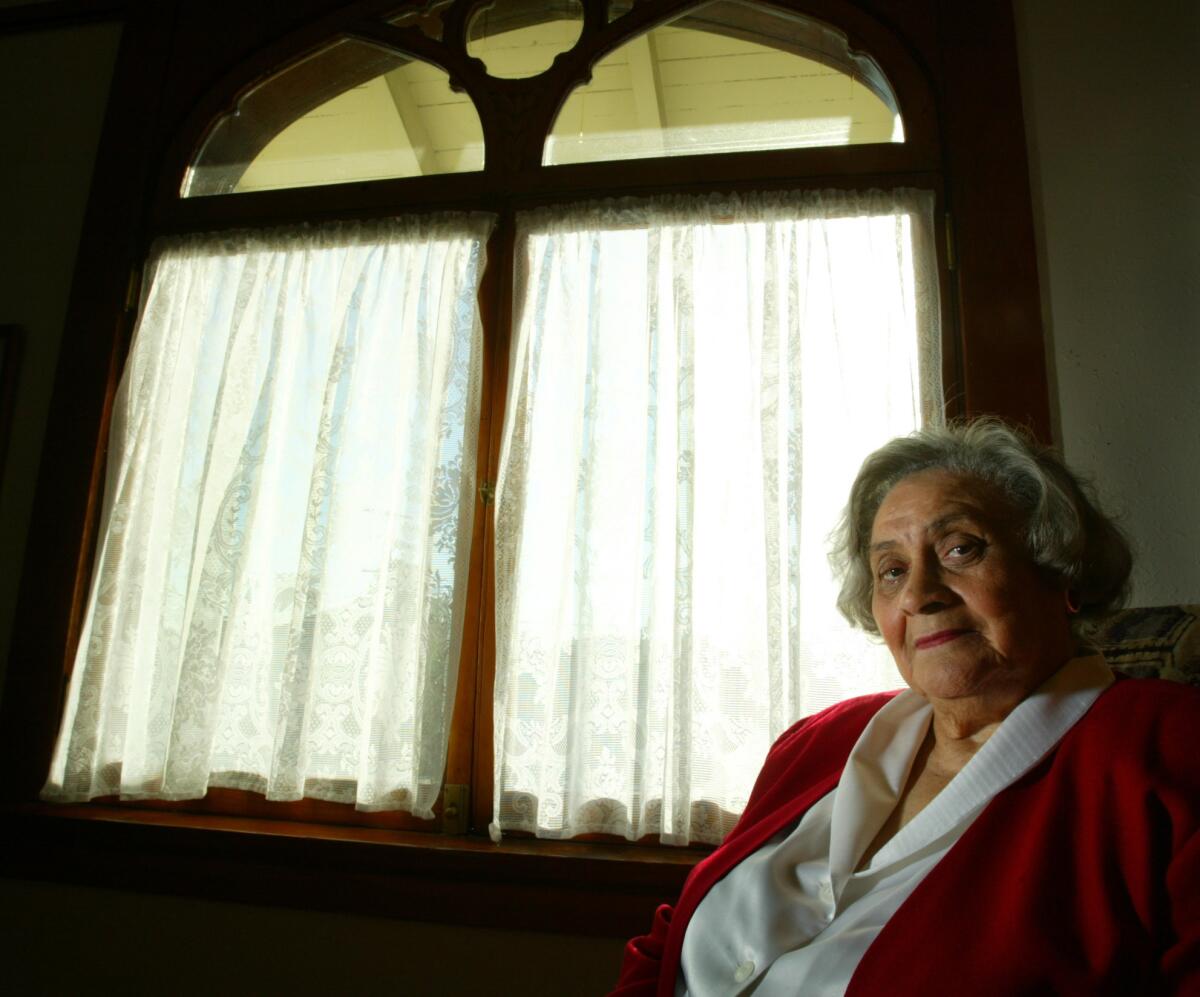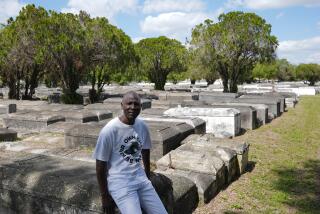Essie Mae Washington-Williams dies at 87; black daughter of segregationist Strom Thurmond

A week before Christmas in 2003, a retired Los Angeles schoolteacher stood before a phalanx of news cameras and 250 reporters in a South Carolina ballroom and declared, “I am Essie Mae Washington-Williams, and at last I am completely free.”
After more than 60 years, Washington-Williams had chosen to unburden herself of a secret: that she, a black woman, had been fathered by a white man — Sen. Strom Thurmond, the legendary South Carolina politician who had built a long Washington career as a champion of segregation.
Thurmond had died five months earlier at age 100, having never acknowledged that his liaison with a family maid when he was 22 had produced a daughter. At 78, Washington-Williams decided she owed it to history to speak up.
PHOTOS: Notable deaths of 2013
“My children ultimately convinced me that history needed to know about Thurmond and that I should set the record straight,” she wrote in the Los Angeles Times in 2003. “I am not doing this for money. I am not suing his estate. I just want to tell the truth.”
Washington-Williams, 87, died Monday of natural causes in Columbia, S.C., said her attorney, Frank K. Wheaton. After more than 40 years in Los Angeles, she moved back to South Carolina a few years ago when her health began to deteriorate.
Her story, with its elements of politics, the old South and the taboo issue of interracial sex, caused a media avalanche, which she handled with grace after she got over her surprise. “It gave her a new life, a new spirit,” the attorney said Monday. “She was just always so tickled that people were so interested in her story. She said, ‘Well, he was just my dad.’ ”
She was born in Aiken, S.C., on Oct. 12, 1925. Her mother, Carrie Butler, gave birth to her when she was 16 and Thurmond was 22 and living in his parents’ home in Edgefield, S.C. When her baby was 6 months old, Butler sent her to live with an aunt and uncle, the Washingtons, in Coatesville, Pa.
In 1941, then-16-year-old Essie returned to South Carolina to visit her mother, who was ailing. Her mother took her to visit Thurmond, who was climbing the political rungs that would lead him to the statehouse and ultimately to the nation’s capital. The teenager knew Butler was taking her to meet her father, but “I was surprised because she never mentioned that he was white,” Washington-Williams told CBS’ Dan Rather many years later.
She recalled that when they met, Thurmond told her, “Well, you look like one of my sisters. You’ve got those cheekbones like our family.” But that was as close as he got to acknowledging that they were kin.
From that point on, Thurmond regularly sent her money. After she graduated from high school in 1945, he encouraged her to attend the all-black South Carolina State College in Orangeburg. He paid her tuition and after he became governor in 1947, visited her on campus, causing rumors to swirl about why the coed had a friend in such a high place.
Her relationship to Thurmond stirred complicated emotions, which she kept to herself.
As governor, Thurmond was a proud, loud segregationist who in 1948 declared publicly that there were “not enough troops in the Army to force the Southern people to break down segregation and admit the nigger race into our theaters, into our swimming pools, into our homes and into our churches.”
“I wasn’t proud of him at that time,” Washington-Williams told The Times in 2004.
One time when she was in college she asked him why he was segregationist “and he said, ‘Well, that’s the way things have always been,’ ” she recalled in the CBS interview.
“I don’t believe he was a racist at heart. And when the times changed, he changed,” she said.
She dropped out of college after her junior year to marry Julius Williams, who became one of the first graduates of the law school at South Carolina State. He became a civil rights lawyer and a leader of the National Assn. for the Advancement of Colored People in Savannah, Ga. They had four children.
Washington-Williams is survived by two daughters, Wanda Williams-Bailey and Monica Hudgens; a son, Dr. Ronald Williams; and many grandchildren and great-grandchildren. A son, Julius, died last year.
Her husband died in 1964. Widowed at 39, Washington-Williams moved her family to Los Angeles, where she finished her bachelor’s degree at Cal State L.A. before earning a master’s in education from USC. Hired as an adult school teacher in the Los Angeles Unified School District, she often worked two jobs, teaching adult school during the day and community college at night.
When Thurmond learned she had been widowed, he increased his financial support — this at a time when he was leading a record-breaking filibuster in the Senate against the historic civil rights bill that eventually passed in 1964.
He continued to have regular contact with his daughter and paid for her children’s college educations.
Washington-Williams was a teacher and administrator in the Los Angeles school district for 30 years, retiring in 1997. She lived in View Park and was an active member of the Congregational Church of Christian Fellowship and the local chapter of a South Carolina State alumni association.
Over the years, reporters had contacted her, asking if she would confirm rumors that Thurmond was her father. She always denied them, saying he was only a close family friend.
“It’s not that Strom Thurmond ever swore me to secrecy. He never swore me to anything,” she wrote in “Dear Senator: A Memoir by the Daughter of Strom Thurmond,” published in 2005. “He trusted me, and I respected him, and we loved each other in our deeply repressed ways, and that was our social contract.”
She had hoped he would publicly acknowledge their relationship before he died, but that admission never came. He died on June 26, 2003, a few months after stepping down as the longest-serving U.S. senator ( later surpassed by Sen. Robert Byrd, the West Virginia Democrat).
Six months later, in a Columbia hotel ballroom not far from where her father’s body had lain in state, Washington-Williams, regal in a red suit, opened her news conference with a simple declaration: “My father’s name was James Strom Thurmond.”
The announcement brought mixed reactions, with some in the African American community questioning why she kept the secret so long and others applauding her for going public. The Thurmond family released a statement acknowledging her claim to her heritage. “We hope this acknowledgment will bring closure for Ms. Williams,” a Thurmond family lawyer said in a brief statement.
“In a way, my life began at 78, at least my life as who I really was,” she wrote in her memoir. “I may have called it ‘closure,’ but it was much more like an opening, a very grand opening.”
More to Read
Start your day right
Sign up for Essential California for the L.A. Times biggest news, features and recommendations in your inbox six days a week.
You may occasionally receive promotional content from the Los Angeles Times.







